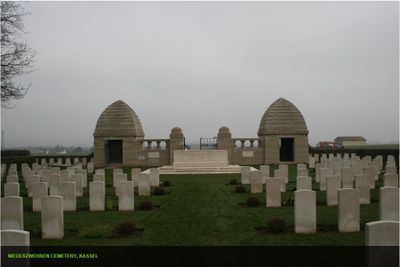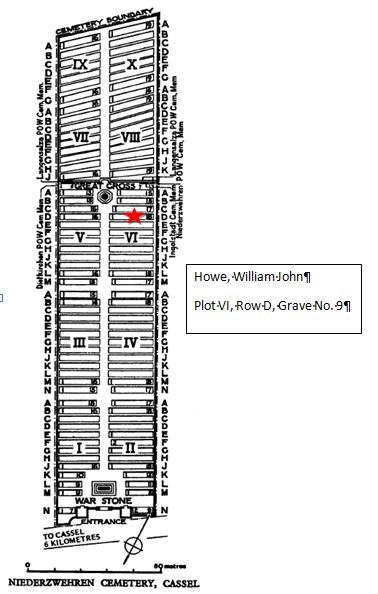Difference between revisions of "William John Howe"
From Our Contribution
| Line 78: | Line 78: | ||
| label22 = Monument | | label22 = Monument | ||
| − | | data22 = [[Jarrahdale War Memorial]]<br />[[Jarrahdale Honour Roll]]<br />[[ANZAC Memorial Park (Byford)]]<br /> | + | | data22 = [[Jarrahdale War Memorial]]<br />[[Jarrahdale Honour Roll]]<br />[[ANZAC Memorial Park (Byford)]]<br />[https://www.awm.gov.au/collection/R1631824 Australian War Memorial] |
| label23 = Medals | | label23 = Medals | ||
Revision as of 02:57, 2 May 2018
 | |
| Personal Information | |
|---|---|
| Date of Birth | 6 Aug 1888 |
| Place of Birth | Jarrahdale, Western Australia |
| Death | 17 Oct 1917 at 3:00am |
| Place of Death | Langebsalza, Germany |
| Age at Enlistment | 27 years, 1 month |
| Description | 5'10¼" (1.78m) tall; weight 150 lbs (68kg); sallow complexion, blue eyes, dark broen hair. |
| Occupation | locomotive fireman |
| Religion | Roman Catholic |
| Address | Jarrahdale, Western Australia |
| Next of Kin | Father Mr Thomas Joseph Howe |
| Military Information | |
| Reg Number | 3148 |
| Date of Enlistment | 5 Oct 1915 |
| Rank | Private |
| Unit/Formation | 28th Battalion, 7th Reinforcement, D Company |
| Date of Embarkation | 18 Jan 1916 - 16 Feb 1916 |
| Ship Embarked On | HMAT A7 Medic |
| Fate |
Missing in Action later Prisoner of War, Died of Wounds in captivity |
| Monument |
Jarrahdale War Memorial Jarrahdale Honour Roll ANZAC Memorial Park (Byford) Australian War Memorial |
| Medals |
British War Medal Victory Medal |
Contents
Pre War
Electoral Roll entries - 1910 a barman at Jarrahdale; 1913 - 1915 a fireman at No.6 Mill, Jarrahdale
War Service
Entered Blackboy Hill camp on 5 Oct 1915 and on 1 Nov 1915 he was allocated to the 7th reinforcement draft for the 28th Battalion.
Taken on strength by the 28th Battalion on 16 Jun 1916 in time to participate in the attacks on Poziéres during July.
On 23 July a 12:30am the 28th Battalion together with the other units in the 1st and 3rd Brigades attacked the enemy front trenches, and pushed on to the ruined village itself. the German response, with this being the only real advance made by on the British Army front, was savage and included three days of heavy shelling of the positions won by the Australians.
Bill's injury was caused by shrapnel from a shell and although he was posted missing on 29 Jul his injury was probably caused by the severe shelling they received from 24 - 27 Jul 1916. In any case the battalion was withdrawn from the line on the 27th, leaving Bill behind for the enemy to tend to. German records show that he was captured on 29 Jul 1916.
Died 17 Oct 1917 from general weakness.
Wounded with shell wounds to the spine, both legs and bladder. Injuries to the back included damage to the 11th and 12th vertebrae. Sgt A.G. Lester of the 14th Hampshire Regiment, not only responded to the Red Cross, but also to Bill's father and sister. He advised that Bill was wounded in the lower spine, leaving him helpless from the waist down, and that he died of a 'consumptive stomach', and was seen several times by a French Priest, who also buried him in the camp cemetery at Langensalza. He felt that the German Doctor had done all that he could with limited resources. [1]
Notes
Buried in Niederzwehren Cemetery, Cassel, Germany (Plot VI, Row D, Grave No 9)

